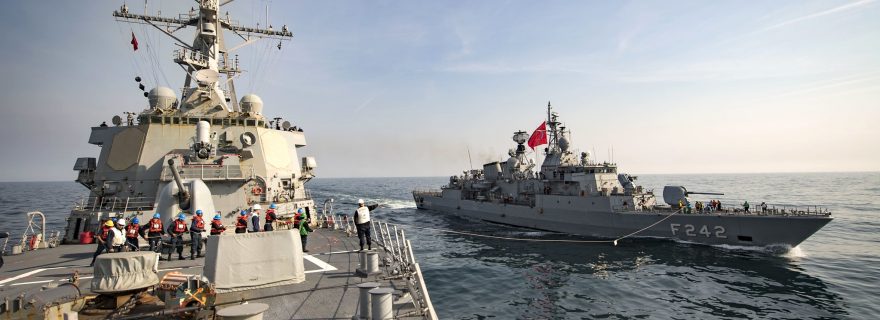Europe in NATO: time for a common Turkish policy
President Erdogan put Turkey on a nationalist road, seemingly at odds with the interests of European states. NATO is often used to support Turkey’s policies and undermine opposition. Adopting a common policy by EU-NATO members on Turkey is becoming increasingly vital to protect European interests.
In June last year, French navy ship Courbet attempted to inspect the merchant vessel Cirkin which was suspected of violating UN arms embargo on Libya. As a consequence, the French ship was targeted by firing radars of Turkish warships which seemed to escort Cirkin. This action, called illumination in naval jargon, represents the last step before firing on an enemy target. This unusual aggressive behavior caused deep embarrassment within NATO as the French and Turkish units involved were all supporting NATO Operation Sea Guardian at that time. Since the incident, Turkey’s adversarial foreign policy does not seem to show any sign of appeasement, making the question of Turkey’s ambiguous role within NATO more pressing. How can it be certain that Turkey does not use the alliance against European interests? Answering the question requires a good understanding of the geopolitical position Turkey holds.
The centrality of Turkey
Turkey's aims at restoring its status as a regional power has been quite successful so far. Its armed forces rank second in terms of manpower among NATO member states, after the United States and before France. Turkey hosts NATO Land Command, as well as several American bases crucial for US operations in the Middle East. Incirlik Air Base most notably hosts US nuclear warheads, being therefore a key element of US deterrence in the region.
Most importantly, Turkey holds a critical position at the crossroad of Asia, Europe, and the Middle East. This centrality makes Turkey a nation with multiple and conflicting identities. Partly European and partly Asian, Islamic but not Arab, both heir and executioner of the Byzantine empire, Turkey is often described as a bridge between the East and the West. This complexity is sometimes perceived as the key to the resolution of regional conflicts. However, it is also a source of misunderstanding and defiance from its neighbors.
Ambitions and reality
Turkey is also an emerging power with a dire need for energy. Having little resources, it is highly dependent on Russian and Iranian fossil fuels. This uncomfortable situation largely explains the aggressive Turkish stance in the Eastern Mediterranean. Although Turkey has the largest coastline, it enjoys a comparatively small Exclusive Economic Zone, as opposed to Greece and its countless islands. This situation became a case of national security for Turkey when the exploitation of underwater resources of natural gas became a realistic prospect.
This is where the centrality of Turkey becomes as much a blessing as it is a curse. President Erdogan has indeed adopted an aggressive and revisionist policy in all directions: Syria, Libya, Aegean Sea, Nagorno-Karabakh, Northern Cyprus. Turkey wants to meddle in all fronts with the aim to become a central actor in these conflicts. The risk of overstretch is real, especially since these actions seem aimed at short-term objectives. Actually, Turkey’s government may be pursuing two distinct purposes: gaining influence in Europe and consolidating an increasingly authoritarian regime.
Consequences for Europe
Turkey’s concern with access to natural resources is a legitimate one: all nations aspire for autonomy and development. The management of the gas reserves of the Eastern Mediterranean is a subject where Turkey is entitled to have a seat among other states.
However, Turkey’s attitude becomes problematic when it comes to its ambitions towards Europe. Former minister Ahmet Davutoglu once compared Turkey’s foreign policy with the image of the crossbow where the string to pull is the Middle East, and the target is Europe. This raises the question of what Turkey’s intentions are in regards to Europe. The increasingly authoritarian regime, the adversarial rhetoric, the migration blackmail, or the attempts to use the European Turkish diaspora as a means of pressure, among other things, are all indications that these intentions are not entirely friendly.
Turkey must be given a chance. First, because Erdogan’s regime might not be eternal and there are liberal forces in Turkey. Second, because there is not much of a choice. NATO cannot expel members, and it would most likely be an ill-advised decision with regards to the geopolitical weight of the country. However, there is room to maneuver on the side of European allies. Turkey has developed the habit of using NATO with a “divide and conquer” philosophy. This is possible as long as Europeans remain divided within the organization. But if a common position can be adopted at EU level and implemented within NATO, this might well give Europeans back the initiative. If European allies are able to define a clear policy and pre-planned actions for Turkish destabilizing endeavors, both at EU and NATO levels, they will be able to gain leverage and produce issue-linkage.
Being able to resist the bullying attitude of President Erdogan may also create the extra confidence and morale Europeans desperately need for the long road towards European strategic autonomy. A coherent European pillar within NATO is the first step.

